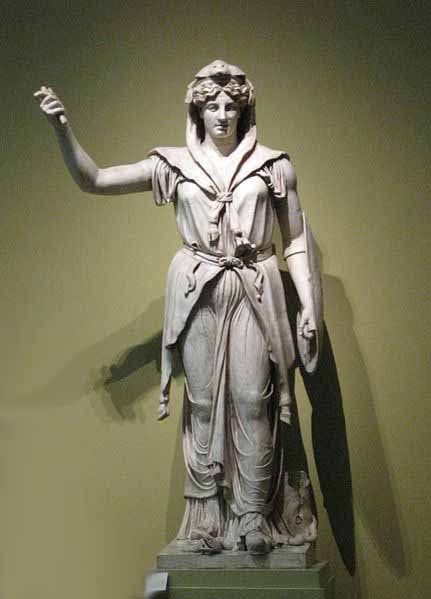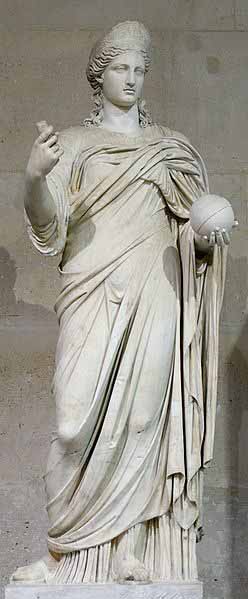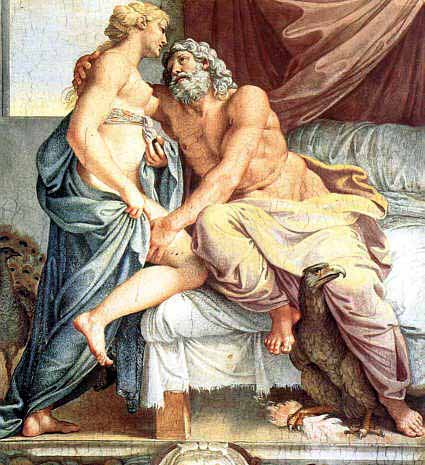



Protector and special counselor of the Roman state and queen of the gods. She is a daughter of Saturn and sister (but also the wife) of the chief god Jupiter and the mother of Juventas, Mars, and Vulcan. As the patron goddess of Rome and the Roman empire she was called Regina ("queen") and, together with Jupiter and Minerva, was worshipped as a triad on the Capitol (Juno Capitolina) in Rome.

As the Juno Moneta (she who warns) she guarded over the finances of the empire and had a temple on the Arx (one of two Capitoline hills), close to the Royal Mint. She was also worshipped in many other cities, where temples were built in her honor.
The primary feast of Juno Lucina, called the Matronalia, was celebrated on March 1. On this day, lambs and other cattle were sacrificed to her. Another festival took place on July 7 and was called Nonae Caprotinae ("The Nones of the Wild Fig").
She can be identified with the Greek goddess Hera and, like Hera, Juno was a majestical figure, wearing a diadem on the head. The peacock is her symbolic animal. Juno is also the protecting and guardian spirit of females.
Juno's own warlike aspect among the Romans is apparent in her attire. She often appeared sitting pictured with a peacock armed and wearing a goatskin cloak. The traditional depiction of this warlike aspect was assimilated from the Greek goddess Athena, whose goatskin was called the 'aegis'.
There is a strong possible etymology from Indo-European yeu or "vital force", as in English young. Such a derivation would be consistent with a descent from the mother goddess. More immediately, her Etruscan name was 'Uni.' Whether Juno comes from the Universe or vice versa or neither remains to be settled.
The month of June was named after her.
Juno's theology is one of the most complex and disputed issues in Roman religion. Even more than other major Roman deities, Juno held a large number of significant and diverse epithets, names and titles representing various aspects and roles of the goddess. In accordance with her central role as a goddess of marriage, these included Pronuba and Cinxia ("she who looses the bride's girdle"). However, other epithets of Juno have wider implications and are less thematically linked.
While her connection with the idea of vital force, fulness of vital energy, eternal youthfulness is now generally acknowledged, the multiplicity and complexity of her personality have given rise to various and sometimes irreconcilable interpretations among modern scholars.
Juno is certainly the divine protectress of the community, who shows both a sovereign and a fertility character, often associated with a military one. She was present in many towns of ancient Italy.
Juno was the protector and special counselor of the Roman state. She is a daughter of Saturn and sister (but also the wife) of the chief god Jupiter and the mother of Juventas, Mars, and Vulcan.
As the patron goddess of Rome and the Roman empire she was called Regina ("queen") and, together with Jupiter and Minerva, was worshipped as a triad on the Capitol (Juno Capitolina) in Rome.
As the Juno Moneta (she who warns) she guarded over the finances of the empire and had a temple on the Arx (one of two Capitoline hills), close to the Royal Mint. She was also worshipped in many other cities, where temples were built in her honor.
The primary feast of Juno Lucina, called the Matronalia, was celebrated on March 1. On this day, lambs and other cattle were sacrificed to her. Another festival took place on July 7 and was called Nonae Caprotinae ("The Nones of the Wild Fig"). The month of June was named after her.
Every year, on the first of March, women held a festival in honor of Juno called the Matronalia. Another festival in her honor, the Nonae Caprotinae ("The Nones of the Wild Fig") was held on July 7. Many people consider the month of June, which is named after the goddess who is the patroness of marriage, to be the most favorable time to marry.
Juno's own warlike aspect among the Romans is apparent in her attire. She often appeared armed and wearing a goatskin cloak, which was the garment favoured by Roman soldiers on campaign. This warlike aspect was assimilated from the Greek goddess Athena, whose goatskin was called the 'aegis.'
Juno was called Regina ("queen"). As Juno Moneta ("she who warns"), she protected the finances of the Roman Empire. Lucina was an epithet for Juno as "she who brings children into light".

The divine couple received from Greece its matrimonial implications, thence bestowing on Juno the role of tutelary goddess of marriage (Iuno Pronuba). However the couple itself cannot be reduced to a Greek apport. The association of Juno and Jupiter is of the most ancient Latin theology.
ANCIENT AND LOST CIVILIZATIONS